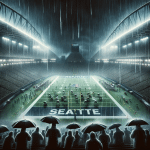Los Angeles Chargers head coach Jim Harbaugh found himself facing a daunting task as he attempted to revive the struggling team following a disappointing 2023-24 season. The Chargers had limped to a 5-12 record straight-up and a 6-11 mark against the spread, leaving fans and analysts alike searching for hope.
The hiring of Harbaugh brought a glimmer of optimism to Los Angeles, as fans believed he could bring about the change needed for success. However, any sense of positivity quickly dissipated when star quarterback Justin Herbert suffered a foot injury during the offseason, casting doubt on the team’s prospects for the upcoming season.
The injury to Herbert, described as a pesky plantar fascia issue, raised concerns about his availability for the start of the 2024 campaign. The condition was one that could linger and potentially hamper Herbert’s performance throughout the year if not given adequate time to heal. The Chargers faced the prospect of beginning the season without their key player, a setback that could derail their plans under the leadership of Harbaugh and offensive coordinator Greg Roman.
With the offense likely to be without Herbert for an extended period, the burden fell heavily on the Chargers’ defense, which lacked depth and experience beyond a few seasoned veterans. The team faced an uphill battle in a tough division, with many predicting a second-place finish behind the dominant Kansas City Chiefs.
Analysts pointed to deficiencies in the Chargers’ receiving corps, run game, and defense as major obstacles that could hinder their progress in the upcoming season. The team’s lack of firepower and reliance on aging players raised doubts about their ability to compete with division rivals like Denver and Las Vegas.
Despite the challenges ahead, Harbaugh remained committed to his vision for the team, emphasizing a run-heavy approach to compensate for Herbert’s absence. The coach had made significant changes to the roster, focusing on bolstering the offensive line and bringing in running backs known for their physicality and toughness.
While Harbaugh’s emphasis on the running game was seen as a potential strength for the Chargers, concerns remained about the team’s ability to overcome deficiencies on defense. The Chargers had struggled against the pass in previous seasons, with opposing quarterbacks finding success through the air.
New defensive coordinator Jesse Minter aimed to address these issues by implementing an aggressive game plan that prioritized pressure on opposing quarterbacks. However, the Chargers’ front seven was considered one of the weakest in the AFC, raising questions about their ability to generate consistent pass rush.
As the Chargers prepared for the upcoming season, the team’s schedule was seen as favorable, with several winnable games on the horizon. Betting markets viewed the Chargers as favorites in many matchups, with a win total of 8.5 projected for the season.
Despite the uncertainties surrounding Herbert’s health and the team’s overall performance, the Chargers remained optimistic about their chances in the upcoming season. With Harbaugh at the helm and a renewed focus on the running game, the team was determined to overcome adversity and compete for a playoff spot in a competitive AFC West division.







